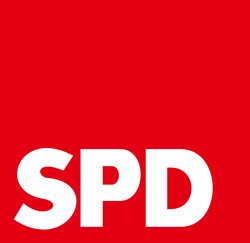Social Democratic Party of Austria
 | |
| Formation | 1863 |
| Interest of | Club 45 |
| Austrian social-democratic political party. | |
The Social Democratic Party of Austria (German: Sozialdemokratische Partei Deutschlands, SPD) is a social-democratic political party in Austria. Along with the Austrian People's Party (ÖVP), it is one of the country's two traditional major parties.
History
Since its foundation in 1889, the SDAPÖ has been one of the main political forces in Austria. At the start of the First World War, it was the strongest party in parliament. At the ending of that war in 1918, the party leader Karl Renner became Chancellor of the First Republic. The SDAPÖ lost power in 1920, but it retained a strong base of support in the capital Vienna. A period of rising political violence culminated in the banning of the SDAPÖ under the Austrofascist dictatorship (1934–1938), continued after the Anschluss in 1938.
In 1945, the party was reconstituted as the Socialist Party of Austria (German: Sozialistische Partei Österreichs, SPÖ) and was led by Adolf Schärf. The SPÖ entered the government of the Second Republic as part of a grand coalition with the Austrian People's Party (ÖVP) until 1966 and with the Communist Party of Austria until 1949. Renner became the first President of Austria.
From 1971 to 1983, the SPÖ under Bruno Kreisky was the sole governing party. For the following three years, it ruled in coalition with the Freedom Party of Austria (FPÖ), then up to 2000 it was again part of a grand coalition with the ÖVP, with Franz Vranitzky as Chancellor until 1997. In 1991, it reverted to including Democratic in its name, becoming the Social Democratic Party of Austria (German: Sozialdemokratische Partei Österreichs).
During this period, the grand coalition combined with the Proporz system, whereby important posts throughout the government were shared out between members of the two main parties, evoked rising discontent. This was a factor in the growing popularity of the FPÖ which came second to the SPÖ in the 1999 Austrian legislative election. The following year, the FPÖ and ÖVP formed a right-wing coalition, displacing the SPÖ from a share in government.
While this coalition was still in power, the SPÖ's Heinz Fischer was elected president in the 2004 Austrian presidential election. Following the 2006 Austrian legislative election, another grand coalition was formed between the SPÖ and the ÖVP, lasting until 2017, when the SPÖ went back to the opposition. In the 2019 Austrian legislative election, the SPÖ lost 12 seats and shrunk to 21.2%.
Party Members
| Politician | Born | Died | Description |
|---|---|---|---|
| Karl Czernetz | 12 February 1910 | 3 August 1978 | Austrian politician regarded as a "party ideologist" of the Social Democratic Party of Austria. Attended the 1963 and 1969 Bilderberg conferences. |
| Alfred Dallinger | 7 November 1926 | 23 February 1989 | Austrian politician, Bilderberg 1979, died in a small plane crash in 1989 |
| Werner Faymann | 4 May 1960 | Austrian chancellor for 7.5 years | |
| Heinz Fischer | 9 October 1938 | President of Austria for 12 years. 3 Bilderberg | |
| Alfred Gusenbauer | 8 February 1960 | Club de Madrid, quad Bilderberger Austrian politician | |
| Peter Jankowitsch | 10 July 1933 | One of the closest collaborators of Chancellor Bruno Kreisky, ex-Bilderberg Steering committee | |
| Bruno Kreisky | 22 January 1911 | 29 July 1990 | Single Bilderberger Austrian Chancellor |
| Erwin Lanc | 17 May 1930 | Attended the 1979 Bilderberg as Austria/Minister of Interior. Club 45. Lucona Affair. Gave passport to Jeffrey Epstein. | |
| Ewald Nowotny | 28 June 1944 | Austrian politician and central banker | |
| Pamela Rendi-Wagner | 7 May 1971 | Austrian physician and "vaccine expert" catapulted to Chairwoman of the Austrian Social Democratic Party (SPÖ) in November 2018. Bilderberg 2018. | |
| Andreas Schieder | 16 April 1969 | Double Bilderberger Austrian politician | |
| Gertrude Trumpel-Gugerell | 11 November 1952 | Austrian central banker. Attended 2 Bilderberg meetings as member of the executive board of the European Central Bank. | |
| Friedrich Verzetnitsch | 22 May 1945 | Austrian politician and President of the Austrian Trade Union Federation. Attended the 1988 Bilderberg meeting. | |
| Franz Vranitzky | 4 October 1937 | Chancellor of Austria, central banker, Bilderberg Steering committee |
Event Participated in
| Event | Start | End | Location(s) | Description |
|---|---|---|---|---|
| Noricum scandal | 1980 | 1980 | Austria Iran Iraq | Illegal sale of artillery guns to Iraq and Iran |